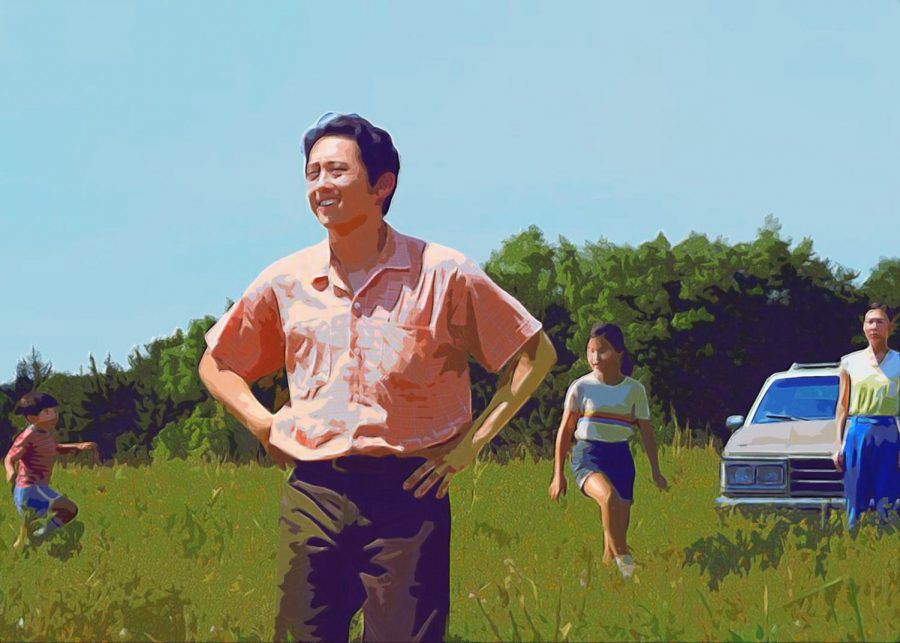Begin to remember: Lee Isaac Chung’s ‘Minari’
Lee Isaac Chung’s distinctive vision of home shines brightly
September 7, 2021
“Minari” is a moving portrait of family, culture and humor. Written and directed by Lee Isaac Chung, the film is a semi-autobiographical depiction of Chung’s upbringing living with his family, who were South Korean immigrants, on a farm in 1980s Arkansas. The family moves cross-country to pursue the father’s dream of owning a farm and tending the land.
The movie has a rather simple narrative, yet one that is elevated by its strong performances. Jacob (Steven Yeun) and his wife Monica (Yeri Han) work as chicken sexers, separating baby chicks by gender. Their American-born children are the calm, mature Anne (Noel Cho) and the curious David (Alan S. Kim). With a tight main cast and several recurring side characters, the film meditates on this familiar idea of the “American Dream,” a theme often explored in film and one that seems to be a character in America’s political landscape. The family in “Minari” work to get by, their dedication and close-knit bond are prevalent in the film, but they also have their fair share of disagreements. The mother, Monica, seems ambivalent about her husband’s sudden decision to move, worried about fitting in and their son’s medical conditions. Later, the arrival of Soonja (Yuh-Jung Youn), the grandmother, brings a refreshing peacefulness to the family. A particularly heartwarming scene comes when Soonja presents Monica with spices, food and fish from Korea, to which she later weeps over. Soonja responds, sarcastically, “You’re crying again? Because of anchovies?” While brief, the scene exemplifies the uncertainty and difficulty the family has finding any semblance of Korea in the United States. Soonja also brings with her profanity, gambling and an affinity for pro wrestling. She quickly butts heads with David, who implies she is not a “real” grandmother. Thankfully, their relationship grows close as the film progresses, and in an integral scene, we learn the meaning behind the film’s title: the two find a small creek by the house where Soonja chooses to plant their minari. She notes the plant’s strength and resilience, which, at the time, David finds silly.
Early in the farm’s development, Jacob befriends a local farmhand named Paul, played with devout ease by Will Patton. In one of their early exchanges, Paul declares that he is a veteran of the Korean War, presenting a potential rift between the two men. However, their friendship blossoms over the extent of the film, and we begin to see Paul’s righteous belief in God. At one point, the family finds him bearing a wooden cross over his back and walking in the heat of the day. One might wonder the significance behind the naming of the character in relation to the Biblical figure; overall, faith is an important theme in the film and something Chung has said he holds a deep reverence for.
Chung’s screenplay is both layered and restrained. The film never seems extravagant, outside of the tumultuous finale. There are tender moments, such as the arrival of Soonja, and somber moments, like when the trappings of a sudden stroke weaken Soonja. Another high point of the film is Emile Mosseri’s wonderful score. Mosseri’s tracks accompany the film in a unique manner, as the film is both natural and expressive; so too is its score, as it permeates a sense of nostalgic wonder. The track that plays over the film’s credits, “Rain Song,” features vocals from Yeri Han.
The film’s ending presents a divisive crossroads and as the family-quite literally-separates, the film’s depiction of unwavering trust is shattered. However, viewers are left with tragedies wrapped in potential beauty. After the film’s fiery finale, the family begins to rebuild. Jacob learns to listen to Monica. David, like his Grandmother, learns to cope with his ailment. Anne begins to find joy. The minari planted earlier in the film does indeed grow, and Chung’s distinctive vision of home shines brightly.








